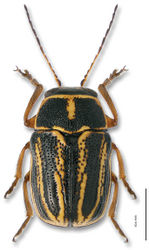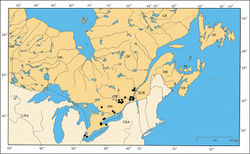Pachybrachis othonus othonus
| Notice: | This page is derived from the original publication listed below, whose author(s) should always be credited. Further contributors may edit and improve the content of this page and, consequently, need to be credited as well (see page history). Any assessment of factual correctness requires a careful review of the original article as well as of subsequent contributions.
If you are uncertain whether your planned contribution is correct or not, we suggest that you use the associated discussion page instead of editing the page directly. This page should be cited as follows (rationale):
Citation formats to copy and paste
BibTeX: @article{Barney2013ZooKeys332, RIS/ Endnote: TY - JOUR Wikipedia/ Citizendium: <ref name="Barney2013ZooKeys332">{{Citation See also the citation download page at the journal. |
Ordo: Coleoptera
Familia: Chrysomelidae
Genus: Pachybrachis
Name
Pachybrachis othonus (Say, 1825) – Wikispecies link – Pensoft Profile
- Cryptocephalus othonus Say, 1825: pl. 28.
- Cryptocephalus marginaticollis Randall, 1838: 46.
Recognition
Body robust. Pronotum black, with all margins and narrow median anterior stripe yellow; each elytron black, with rather narrow sub sutural, discal and marginal vittae yellow; legs yellow. Punctures of pronotum larger and denser than those on elytra; elytral punctures in somewhat regular rows on disc and sides (Habitus 11); male size medium: length 2.63 ± 0.12 mm, width 1.56 ± 0.09 mm.
Distribution
A typical eastern species distributed from North Dakota to Texas to the Atlantic Coast in the United States (Riley et al. 2003[1]), and in the south of Ontario and Québec in eastern Canada (Map 11).
Material examined
ONTARIO: Carleton Co., Britannia, 17.VI.1948, S. D. Hicks [1♂, CNC]; same data, except 23.VI.1950, R. de Ruette [1♀, CNC]; Constance Bay, 14.VII.1950, S. D. Hick [1♀, CNC]; Dirleton, 4.VII.1956, S. D. Hicks [1♀, CNC]; Ottawa, 7.VIII.1914, F. G. Ouellet [1♂, IDM]; same data, except 15.VII.1957, J. E. H. Martin [1♂, CNC]; Essex Co., Leamington, 24.VI.1940, W. J. Brown [1♀, CNC]; Ojibway, 27.VI.1943, S. D. Hicks [1♀, CNC]; same data, except 10.VI.1944 [1♂, CNC]; Roseland, 17–24.VI.1944, S. D. Hicks [1♂ 3♀, CNC]; same data, except 17.VI.1946 [2♀, CNC]; same data, except 30.VI.–13.VII.1946 [2♂ 9♀, CNC]; Halton Co., Burlington, 1920, G. M. Stirrett [1♂ 1♀, CNC]; Hastings Co., Chatterton, 16.VII.1950, J. F. Brimley [2♂, CNC]; same data, except 2.VII.1951, J. C. Martin [1♀, CNC]; Marmora, 6.VII.1951, J. F. McAlpine [1♂, CNC]; same data, except 29.VIII.1952, C. Boyle [1♂, CNC]; Lanark Co., Bell’s Corners, 15–26.VI.1950, S. D. Hicks [1♂ 2♀, CNC]; same data, except 4.VII.1950 [1♀, CNC]; Niagara Co., St. Catherines, Decew Falls, 27.VII.1940, S. D. Hick [1♀, CNC]; Toronto Co., Kingsport, 3.VII.1965, D. D. Munroe [1♂ 1♀, CNC]; Toronto, 26.VI.1896, C. T. Hills [1♂ 2♀, LEM]; same data, except 27.V.1896 [1♂ 2♀, LEM]; same data, except 9.VI.1905, E. C. Oakley [3♀, ROM]; same data, except F. Knab [3♂ 1♀, USNM]; Wentworth Co., Ancaster, 10.VII.1965, J. E. Martin [2♂, CNC].
QUÉBEC: Berthier Co., Berthierville, 27.VII.1938, J. Ouellet [1♀, CEUM]; same data, except 8.VII.1950 [1♀, CEUM]; Lanoraie, 1.VII.1932 [1♂, CEUM]; Chambly Co., Boucherville, 1.VII, J. Ouellet [1♀, CEUM]; Deux-Montagnes Co., Saint-Eustache, 12.VIII.1917, J. Ouellet [2♀, CEUM]; Saint-Placide, 13.VII.1931, J. Ouellet [1♀, CEUM]; Gatineau Co., Aylmer, 21.VII.2009, ex. Hypericum, Lythrum, Daucus, graminées, etc, L. LeSage [1♀, CNC]; Île-de- Montréal Co., Montréal, 14.VII.1904, Beaulieu [1♀, USNM]; Joliette Co., Joliette, 12.VII.1909, J. Ouellet [1♀, CEUM]; same data, except 7–13.VII.1922 [29♂ 46♀, CEUM]; Napierville Co., Saint-Rémi, 1.VII.1920, J. Ouellet [1♂ 1♀, CEUM]; Papineau Co., Montebello, 16.VII.1937, J. Ouellet [1♀, CEUM]; Pontiac Co., Beech Grove, 18.VII.1951, J. F. McAlpine [1♀, CNC]; Yarm, 23.VII.1955, C. H. Mann [1♂, CNC]; Vaudreuil Co., Hudson Heights, 24–30.VII.1956, Lindberg [1♀, CNC]; Rigaud, 5.VII.1920, J. Ouellet [2♂ 1♀, CEUM].
Host plants
No specific plant associations were recorded on labels of specimens examined. Chagnon (1937[2], 1940[3]) and Chagnon and Robert (1962)[4] gave willow (Salix sp.) (Salicaceae) as a host in Québec, but Pachybrachis othonus was reported on a large number of questionable “hosts” by authors (details in Clark et al. 2004[5]). Barney and Hall (2011)[6] reported feeding, mating and oviposition on Desmodium marilandicum (L.) (Fabaceae).
Comments
Balsbaugh (1973)[7] and Riley et al. (2003)[1] recognized Pachybrachis othonus as having three subspecies in North America.More information on habitats and hosts are needed on Pachybrachis othonus othonus, which is one of the easiest species to recognize.
Taxon Treatment
- Barney, R; LeSage, L; Savard, K; 2013: Pachybrachis (Coleoptera, Chrysomelidae, Cryptocephalinae) of Eastern Canada ZooKeys, 332: 95-175. doi
Other References
- ↑ 1.0 1.1 Riley E, Clark S, Seeno T (2003) Catalog of the leaf beetles of America north of Mexico (Coleoptera: Megalopodidae, Orsodacnidae and Chrysomelidae, excluding Bruchinae). Coleopterists Society, Special Publication no. 1, 290 pp.
- ↑ Chagnon G (1937) Contribution à l’étude des Coléoptères de la province de Québec. Le Naturaliste canadien 64: 20–30; 101–117; 216–228; 243–253.
- ↑ Chagnon G (1940) Contribution à l’étude des Coléoptères de la province de Québec. Département de Biologie de l’Université de Montréal, Montréal, Québec, 385 pp.
- ↑ Chagnon G, Robert A (1962) Principaux Coléoptères de la province de Québec. Les Presses de l’Université de Montréal, Montréal, Québec, 440 pp.
- ↑ Clark S, LeDoux D, Seeno T, Riley E, Gilbert A, Sullivan J (2004) Host plants of leaf beetle species occurring in the United States and Canada. The Coleopterists Society, Special Publication No. 2, 476 pp.
- ↑ Barney R, Hall S (2011) New host plant records for selected Cryptocephaline leaf beetles (Coleoptera: Chrysomelidae) in Kentucky. The Coleopterists Bulletin 65(1): 15-19. doi: 10.1649/0010-065X-65.1.15
- ↑ Balsbaugh E (1973) Geographical variation in Pachybrachis othonus (Coleoptera: Chrysomelidae) with descriptions of a new subspecies. Annals of the Entomological Society of America 66(2): 252-261.
Images
|

